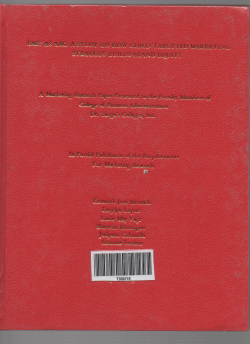EASY AS ABC: A STUDY ON 110W CHILD-TARGETED MARKETING STRATEGY BUILDS BRAND EQUITY

Type
Thesis
Authors
Category
CBA
[ Browse Items ]
Subject
Child-targeted marketing
Abstract
While most of the papers regarding child-targeted marketing center in the ethical issues raised upon it, this study took an ambitious path. This qualitative paper explored and mapped the unnoticed benefits of the said strategy in establishing brand equity. Massive researches suggest that there are three components needed in attaining brand equity. These components were presented here as ABC where each letter stands for A-uthority over financial aspects, B-rand awareness and C-ustomer loyalty. The instruments used in this study include an assessment tool validated by experts so as to evaluate whether the chosen companies already have an established brand equity or not. After assessing the firms, the study became limited only to companies operating as both product and service businesses for the firms that passed the assessment are characterized as quick service restaurants. The researchers then gathered all the data needed through interviews with the marketing managers of the firms. Content analysis method was used wherein the transcribed data were analyzed on a line per line basis letting the researchers formulate individual meanings for all the significant statements. This was followed by categorizing and clustering the coded meanings leading to the creation of emergent themes. Findings revealed three steps on how the strategy builds brand equity. These steps were presented in this paper through a framework, the ALPHABET framework which is an acronym for A Learning Pattern on How to Achieve Brand Equity through Targeting children. According to the framework, these three steps with their corresponding benefits are: 1) Through constantly positioning the brand in the minds of children, they are becoming aware of it which eventually leads to them becoming its unpaid word-of-mouth advertisers bragging about it to their friends, playmates and others, 2) By taking advantage of the pestering power of children, the company gain control over the financial aspects which is evident through anticipated cash flows and unplanned purchases of the guardians, and 3) The combination of these two procedures prompt customer loyalty. Theory of planned behavior and theory of the mind seamlessly support this finding. Once children had already associated an autobiographical memory of the brand, unknowingly, they will start becoming loyal to it to the point that when they grow up, they will recommend the brand to their partners, friends and even children of their own. This makes the process endless which is the reason why the chosen companies are still existing, growing and leading the market today. Indeed, where there are children, there is brand equity. Start-up businesses especially quick service restaurants may implement the framework as their fundamental strategy in order to achieve sustainable success in business. For further studies, the researchers recommend the use of companies which are tangible or intangible dominant as informants for this may bring different findings.
Number of Copies
1
| Library | Accession No | Call No | Copy No | Edition | Location | Availability |
|---|---|---|---|---|---|---|
| Main | 4 | T Ea797 2017 | 1 | Yes |